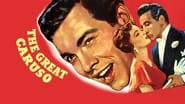Develiker
terrible... so disappointed.
Dorathen
Better Late Then Never
Cody
One of the best movies of the year! Incredible from the beginning to the end.
Darin
One of the film's great tricks is that, for a time, you think it will go down a rabbit hole of unrealistic glorification.
bkoganbing
Since musicals have both gone out of fashion and are incredibly expensive to make without all the talent needed to make one under contract to a studio, I doubt we will ever get a real life story of Enrico Caruso. But if everything else was in place it was no accident that no Hollywood studio attempted the task until Metro-Goldwyn-Mayer had Mario Lanza under contract. No one else could have done it, I doubt whether it will ever be tried again.And why should it. I think Enrico Caruso himself would have been satisfied as to how his singing was portrayed on screen. For his tenor voice was his life, his reason for being on the earth. To say that liberties were taken with his life is to be modest. Caruso, like the man who portrayed him, was a man of large appetites although with a lot more self discipline. He had numerous relationships with several women and fathered two out of wedlock sons who are not in this film. His contribution to the recording industry is treated as almost an afterthought. He's shown in a recording studio once late in his life. Actually he started recording right around the turn of the last century and together with Irish tenor John McCormack for RCA Victor made the recording industry what it became.When Caruso and McCormack were at their heights you had to practically inherit a ticket to see either of them perform live. But a lot of immigrant Italian and Irish families had a phonograph and a record or three of either of these men. It's why both became the legends that they are.What the film does have is some beautifully staged operatic arias done by Mario Lanza, a taste of what he might have become had he the discipline of a Caruso to stick to opera. The Great Caruso won an Oscar for sound recording and received nominations for costume and set design.Mario himself helped popularize the film with an RCA Red Seal album of songs from The Great Caruso. Unfortunately due to contractual obligations we couldn't get an actual cast album with Ann Blyth, Dorothy Kirsten, and Jarmila Novotna also.Though Blyth sang it in the film, Lanza had a big hit recording of The Loveliest Night of the Year further helping to popularize The Great Caruso.If you're looking for a life of Enrico Caruso, this ain't it. If you are looking for a great artist singing at the height of his career, than you should not miss The Great Caruso.
didi-5
By far the best thing about 'The Great Caruso' is not its stodgy script or its slightly silly plot (not very likely that much of this equates to the true story of Enrico Caruso, the first opera star to have his voice immortalised for all time), but the first rate singing throughout. Mario Lanza of course was a great asset to MGM through the late 1940s and early 1950s, with a fabulous voice and an attractive personality on the screen. This film also gives us the opportunity to see the lovely Dorothy Kirsten, who seems to have made very few films, and a sweet performance from Ann Blyth as the main love interest for Caruso.We watch the young Enrico (played with charm by Peter Edward Price) grow into an enterprising young man who realises his voice is potentially his fortune. As the young talent flourishes and develops we follow his rise to fame through to his eventual inevitable ending. I didn't get much sense that the character we were seeing in this film was 'Caruso'; having heard his recordings he projected a very different personality than that we see in Lanza; still, this production is entertaining enough.
BobLib
Let me just say this, and then feel free to comment: I truly don't think that the late, great Mario Lanza ever had a better cinematic vehicle for his talents than "The Great Caruso." His larger than life personality and magnificent voice were never better served than here.Like Caruso before him, and long before the Three Tenors and Andrea Bocelli, Lanza became THE tenor superstar of his generation. If there is anyone who wants to know why, just listen to him sing some of the magnificent arias in this film. "Cielo e Mar," "E Lucevan le stelle," and especially his matchless "Vesti la Giubba," are evidence enough that Lanza could, indeed, have become bigger than Caruso, had not his excesses caught up with him at such a young age.I have just a couple of negative comments to insert here. First, the plot, while it makes for a good story, actually has very little to do with Caruso's life (Read Enrico Caruso Jr.'s "Caruso: My Father and My Family" for a good, readable biography. He even compliments Lanza and his performance!). For one thing, Caruso didn't die on stage, but several months after that last performance at the Metropolitan. Second, the "Italian" mannerisms in this movie are straight out of the Henry Armetta/"Life with Luigi" school, stereotyped to the hilt.But, given the overall scheme of things, these are relatively minor complaints. As to the rest, I say that, for those of you who've never heard Lanza and wonder why he was so great, this film will give you ample proof. For those of you who were there when Lanza was in his prime, here's a chance to live it all over again. A great film, and a matchless tribute to TWO of the legendary voices of our time.
Billy-34
I loved this film and it's both moving and well acted. Lanza's best film I think...he really is terrific and his co-stars as well. Rent this or buy it...it's that good.

